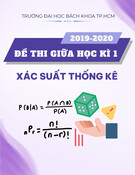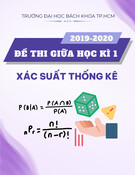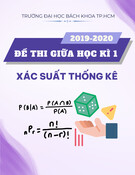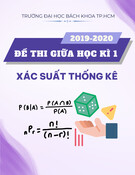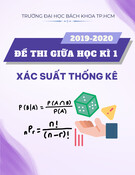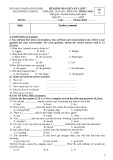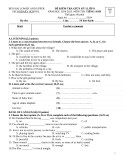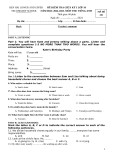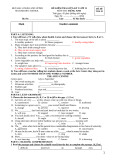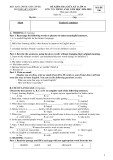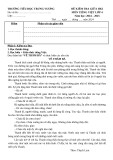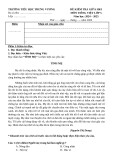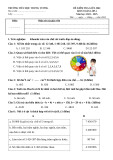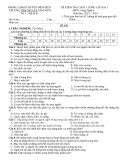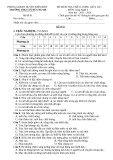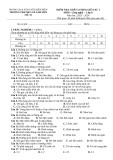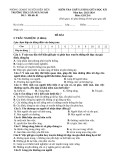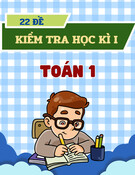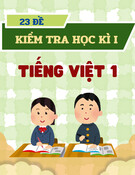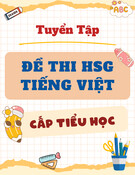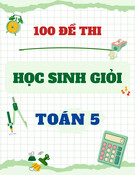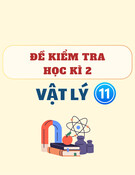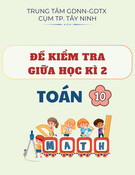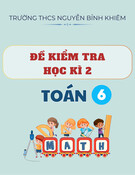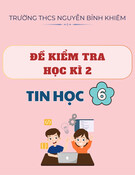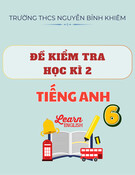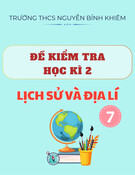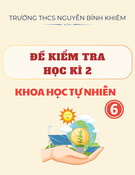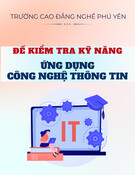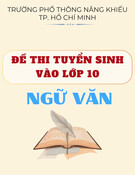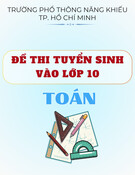KIỂM TRA GIỮA KỲ I NĂM HỌC 2022-2023 Môn: TIẾNG ANH – Lớp: 12 Thời gian: 45 phút (không kể thời gian giao đề) SỞ GD-ĐT QUẢNG NAM TRƯỜNG THPT NÚI THÀNH ĐỀ CHÍNH THỨC (Đề gồm có 02 trang) MÃ ĐỀ 501
C. finished C. stays B. discussed B. helps D. developed D. mails
D. pointing D. sacrifice C. marriage C. different B. maintain B. mischievous
B. last week C. the previous week D. the following week
B. not wear C. not wearing D. did not wear
C. to B. with
D. drives
D. knew C. had known B. have known
D. formal B. non-verbal
D. after
B. if I visited C. if did visit D. if had I visited
B. education C. educationally D. educational
B. brought out D. brought up
D. have been laid C. are being laid
B. advance D. ability C. order
C. take D. join
B. to my house, C. did D. my
D. two years B. to escape C. a
C. courteous B. decent D. gentle
D. left B. got C. set
D. turn down C. refuse
D. required
- Minh: ................................. B. That's a nice compliment C. You're right D. I like to hear your words.
-Tom: “________” C. Not so bad. And you? D. Not at all. Go ahead. Choose the word whose underlined part differs from the other three in pronunciation in each of the following questions. Question 1. A. conducted Question 2. A. joins Choose the word that differs from the other three in the position of primary stress in each of the following question. Question 3. A. signal Question 4. A. attractive Choose the letter A, B, C or D on your answer sheet to indicate the correct answer to each of the following questions. Question 5. Peter said he would leave for Paris ________. A. next week Question 6. The teacher asked her students ________ eans at school.. A. not to wear Question7. We might raise our hands and wave ________ our friends as a signal that we saw them. D. for A. in Question 8. Daisy often____ car to the office. A. drive C. has driven B. is driving Question 9. Ann and Susan ________ each other since they were at school. A. would know Question 10. Gestures such as waving and raising hands are ________ forms of communication. A. impolite C. verbal Question 11. My son went to bed ________ he had done his homework. C. hardly B. until A. by the time Question 12. Mary asked me ________ my grandparents in the countryside the week before. A. If I had visited Question 13. Children receive its early ________ at home so parents should buy some educational magazines to put them in the bookcase. A. educate Question 14. Many problems have ________ since the beginning of the school year. A. come out C. come up Question 15. The tables ________ at the party by the waiters at the present. A. is being laid B. is laid Question 16. Those students are now working day and night in an________ to pass the final exam. A. attempt Question 17. It’s parents' duty and responsibility to________ hands to take care of their children and give them a happy home. A. hold B. shake Choose the underlined part that needs correction in the following questions. Question 18. When Peter came to my house, I did my homework last night A. came Question 19. Maria is said to escape from a fire two years ago. A. said Choose the word(s) CLOSEST in meaning to the underlined word(s) in the following questions. Question 20. In most situations, pointing at someone is usually considered to be impolite. A. rude Question 21. Her ideas have attracted the professor’s attention in the scientific community. A. given Choose the word(s) OPPOSITE in meaning to the underlined word(s) the following questions. Question 22. The majority of Asian students reject the American view that marriage is a partnership of equals. B. object A. accept Question 23. School uniform is compulsory in most of Vietnamese schools. A. obligatory C. optional B. paid Choose the sentence that best completes each of the following exchanges: Question 24. Two friends Tuan and Minh are talking about Minh’s performance. - Tuan: How well you are playing ! A. I'm proud of it Question 25. Mary and Tom are talking about what to do after work. Mary:- “Do you fancy going to a movie this evening?” A. I’m sorry. I don’t know that.B. That would be great. Read the following passage and choose the correct word or phrase that best fits each of the numbered blanks:
Culture has a strong influence on non–verbal (26) ________. Even the simple act of looking someone in the eye is not at all that simple. In the USA, Americans are encouraged to look directly at people when speaking to them. It shows interest (27) ________ what they are saying and is thought to carry a sense of honesty. Meanwhile, in Japan and Korea, people avoid long periods of eye contact. It is considered more polite to look to the side during a conversation. The Lebanese, in contrast, stand close together and look intensely into each other’s eyes. The action shows sincerity and gives people a better sense of what their Mã đề 501 - https://thi247.com/
Trang 1/2
C. communication C. at C. where C. But C. keeping B. communicative B. to B. whose B. Because B. developing D. communicate D. in D. which D. So D. improving counterparts want. Given such differences with even the most common expressions, people (28) ________ travel or work abroad have a real need to learn the other culture’s body language. People tend to be unaware of the messages they are sending to others. (29) ________, it is useful to consider your own body language before dealing with people from other cultures. Knowing about the body language of friends, clients, and colleagues can be very helpful in (30)________ understanding and avoiding miscommunication. Question 26. A. communicatively Question 27. A. about Question 28. A. who Question 29. A. However Question 30. A. preventing Read the following passage and choose the correct answer to each of the questions.
Harvard University, today recognized as part of the top echelon of the world’s universities, came from very inauspicious and humble beginnings. This oldest of America universities was founded in 1636 , just sixteen years after the Pilgrims landed at Plymouth. Included in the Puritan emigrants to the Massachusetts colony during this period were more than 100 graduates of England’s prestigious Oxford and Cambridge universities, and these university graduates in the New World were determined that their sons would have the same educational opportunities that they themselves had had. Because of this support in the colony for an institution of higher learning, the General Court of Massachusetts appropriated 400 pounds for a college in October of 1636 and early the following year decided on a parcel of land for the school; this land was in an area called Newetowne, which was later renamed Cambridge after its English cousin and is the site of the present-day university.
When a young minister named John Harvard, who came from the neighboring town of Charlestowne, died from tuberculosis in 1638, he willed half of his estate of 1,700 pounds to the fledgling college. In spite of the fact that only half of the bequest was actually paid, the General Court named the college after the minister in appreciation for what he had done.The amount of the bequest may not have been large, particularly by today’s standards, but it was more than the General Court had found it necessary to appropriate in order to open the college.
C. types of books B. college students D. school campuses
B. What he died of D. Where he was buried
B. the oldest university in the world D. One of the oldest universities in the world
B. Oxford and Cambridge universities C. university graduates D. educational opportunities
B. I have been working in this company for five years. D. When I worked in this company, I started in five years
B. She told me she had visited him the day before D. She told me she visited him yesterday.
B. After Minh had gone to bed, he finished his work. D. Before Minh finished his homework, he had went to bed.
Henry Dunster was appointed the first president of Harvard in 1640, and it should be noted that in addition to serving as president, he was also the entire faculty, with an entering freshman class of four students. Although the staff did expand somewhat, for the first century of its existence the entire teaching staff consisted of the president and three or four tutors. Question 31. The main idea of this passage is that . A. What is today a great university started out small B. .Harvard is one of the world's most prestigious universities. C. John Harvard was key to the development of a great university D. Harvard University developed under the auspices of the General Court of Massachusetts Question 32. The "pounds" in the second paragraph are probably A. units of money Question 33. Which of the following is NOT mentioned about John Harvard? A. Where he came from C. How much he bequeathed to Harvard Question 34. The passage indicates that Harvard is____ A. the oldest university in America C. one of the oldest universities in America Question 35. The pronoun "they" in the first paragraph refers to A. sons Choose the letter A, B, C, or D on your answer sheet to indicate the sentence that is closest in meaning to the sentence given. Question 36. I started working in this company five years ago. A. I haven't worked for this company for five years. C. As soon as it was five years, I had worked for this company. Question 37. “I visited him yesterday”,said she. A. She told me she had visited him yesterday. C. She said me I visited him the day before. Question 38. People say that six out of the seven wonders of the ancient world were destroyed. A. It was said that six out of the seven wonders of the ancient world were destroyed. B. Six out of the seven wonders of the ancient world are said to have been destroyed. C. It is said that six out of the seven wonders of the ancient world are destroyed. D. Six out of the seven wonders of the ancient world are said to be destroyed. Choose the letter A, B, C, or D on your answer sheet to indicate the sentence that best combines each pair of sentences. Question 39. Minh finished his homework. Then he went to bed. A. Minh went to bed after he had finished his homework. C. Minh had gone to bed by the time he finished his homework. Question 40. I arrived at work. The secretary soon knocked at the door. A. Had the secretary knocked at the door, I would have arrived at work. B. Hardly had the secretary knocked at the door when I just arrived at work. C. As soon as I had arrived at work as the secretary knocked at the door. D. No sooner had I arrived at work than the secretary knocked at the door. ------ THE END------

